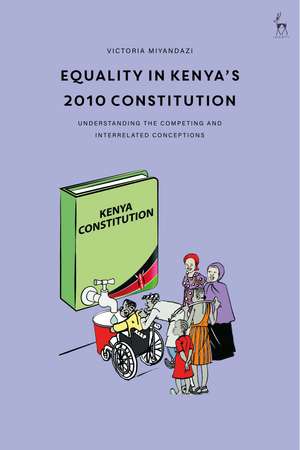Equality in Kenya’s 2010 Constitution: Understanding the Competing and Interrelated Conceptions
Autor Victoria Miyandazien Limba Engleză Paperback – 19 oct 2022
| Toate formatele și edițiile | Preț | Express |
|---|---|---|
| Paperback (1) | 218.36 lei 6-8 săpt. | |
| Bloomsbury Publishing – 19 oct 2022 | 218.36 lei 6-8 săpt. | |
| Hardback (1) | 468.66 lei 6-8 săpt. | |
| Bloomsbury Publishing – 24 feb 2021 | 468.66 lei 6-8 săpt. |
Preț: 218.36 lei
Preț vechi: 275.24 lei
-21% Nou
Puncte Express: 328
Preț estimativ în valută:
41.78€ • 43.83$ • 34.78£
41.78€ • 43.83$ • 34.78£
Carte tipărită la comandă
Livrare economică 01-15 aprilie
Preluare comenzi: 021 569.72.76
Specificații
ISBN-13: 9781509945290
ISBN-10: 1509945296
Pagini: 304
Dimensiuni: 156 x 234 x 20 mm
Greutate: 0.38 kg
Editura: Bloomsbury Publishing
Colecția Hart Publishing
Locul publicării:London, United Kingdom
ISBN-10: 1509945296
Pagini: 304
Dimensiuni: 156 x 234 x 20 mm
Greutate: 0.38 kg
Editura: Bloomsbury Publishing
Colecția Hart Publishing
Locul publicării:London, United Kingdom
Caracteristici
A comparative analysis of the approach to equality in the constitutions of the USA, the UK, Canada, South Africa, India, and Botswana
Notă biografică
Victoria Miyandazi is Researcher for the Oxford Human Rights Hub, University of Oxford, UK.
Cuprins
1. Introduction 2. Interpretation of Kenya's 2010 Constitution I. The Transformative Nature of Kenya's 2010 Constitution and its Effect on Constitutional Interpretation II. Constitutional Interpretation under the Previous Kenyan Constitution III. Interpretation of Kenya's 2010 Constitution IV. Conclusion 3. Multiple and Competing Conceptions of Equality I. Historical Overview of Inequalities and Discrimination in Kenya II. What Understandings of Equality are Encapsulated in Article 27 and Related Provisions of the Constitution?III. To What Extent Does the Constitution's Equality Guarantee Advance Transformative Constitutionalism? IV. Conflicting Interpretations of Equality in Recent Case Law V. Conclusion 4. Grounds for Non-discrimination I. Laying the Background II. The 2010 Constitution's Inclusion of a Non-exhaustive List of Grounds and the Court's Role in Expanding the List of Grounds III. What Considerations are or Should be Taken into Account in Expanding the List of Grounds for Non-discrimination in Article 27(4)? Lessons from Canada and South Africa IV. Do Kenyan Courts in Current Cases Apply the Identified Requisites When Considering Unenumerated Grounds? Should They? V. What Do the Principles Unifying the List of Grounds Reveal About the Underlying Approach to Equality in the Constitution? VI. Conclusion 5. Conceptualisation and Application of Affirmative Action I. Affirmative Action Measures in the Kenyan Constitution II. Aims of Affirmative Action as Evident from Constitutional Provisions III. Determining the Beneficiaries - Principle of Genuine Need IV. Are Affirmative Action Measures Mandatory and Immediate or Should They be Progressively Realised? V. Role of Courts and Judicial Scrutiny in Affirmative Action CasesVI. Conclusion 6. Competing Equalities: Religion, Culture and Gender Equality I. Culture, Religion and Gender Equality in the 2010 Constitution II. Key Rationales for the Right to Culture and Religion Analysed Th rough the Lens of Harmful Practices that Violate Gender Equality III. Proposed Approaches to Balancing between Gender Equality and Accommodating the Right to Culture and Religion IV. Exemption of Islamic Personal Law from the Automatic Application of Equality Provisions in the Bill of Rights and What this Means for Gender Equality V. Conclusion 7. The Interrelationship between Socio-economic Rights and Status-based EqualityI. Interrelationship between Socio-economic Rights and Status-based Equality in the Kenyan Constitution II. Establishing the Analytical Framework for Linking Socio-economic Rights (Redistributive) andStatus-based Equality III. Applying the Analytical Framework to Kenya IV. Pulling it All Together V. Conclusion 8. Interrelationship between Socio-economic Rights and Status-based Equality in Current Kenyan Jurisprudence I. Access-to-justice Challenges that Warrant an Equality-sensitive Approach to Socio-economic Rights Adjudication II. Prioritisation of Socio-economic Needs of Vulnerable Groups III. Desirability of an Equality-sensitive Approach in Setting Standards of Review for Assessing Socio-economic Rights Claims IV. Conclusion Conclusion: Finding Harmony
